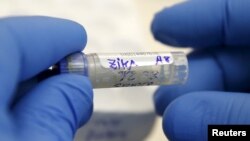The U.S. government has begun the first clinical trial of an experimental Zika vaccine. Anthony Fauci, the director of the National Institute of Allergy and Infectious Diseases, made the announcement, “I am pleased to report that we have begun, on August 2, testing an investigational DNA vaccine intended to prevent Zika virus infection.”
The experimental vaccine has shown a good response in animal models. Fauci says investigators should know soon whether it is safe for use in the first trials involving 40 human volunteers in the United States.
“If we get a good immune response and there are no safety red flags by the end of December 2016, we should know if it’s okay to move on to phase II,” he said.
He said plans are under way to begin that second round of clinical trials at the start of 2017.
Phase II clinical trials are larger human studies involving more participants. They would be conducted in endemic countries, testing not only the safety of the Zika vaccine but its effectiveness in raising an immune response.
The mosquito-borne Zika virus usually causes mild illness in otherwise healthy people; but, the real danger is to the fetus of pregnant women.
If infected with the virus, women can give birth to babies with a severe condition known as microcephaly, in which newborns' heads and brains are unusually small. Microcephaly can cause mental and physical disability, seizures and even death.
Initially, the vaccine’s main target will be women of childbearing age, but, Fauci says there’s no reason to believe the vaccine would not be safe in pregnant women. And, because the virus can be transmitted sexually by an infected partner, researchers would also be looking to prevent the disease in the general adult population.
New technique
The vaccine was developed with a relatively new technology. Rather than using whole inactivated or live-weakened viruses, this vaccine was genetically engineered to contain a small piece of Zika DNA, so small that it’s not infectious, but enough to stimulate an immune response.
Fauci says the DNA approach is convenient, making it easy to scale up the vaccine quickly. It would be injected into the arms of volunteers - and eventually members of the public - using a failsafe spring-loaded injector.
“We cannot afford to delay the development of a safe and effective vaccine to prevent Zika virus infection,” he said.
Outbreaks have now occurred in 50 countries and territories, primarily in Central and South America and the Caribbean. Because of Zika, some public health officials have called for the cancellation of the Summer Olympic Games set to open Friday in Brazil.
This week, a number of Zika cases were reported in the U.S. state of Florida, all caused locally by infected mosquitoes.





